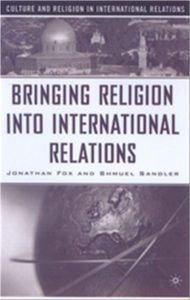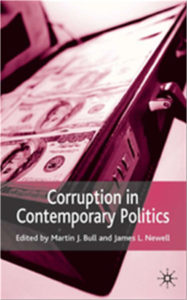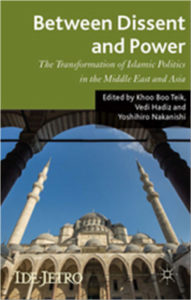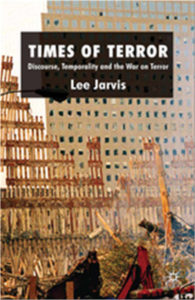
Bringing Religion Into International Relations
Editors: Fox, J., Sandler, S. (Eds.)
Palgrave (2004)
Rs8,195
This book has several main themes and arguments. International Relations has been westerncentric, and has contributed to how we ignore religion; while religion is not the main driving force behind IR, international politics cannot be understood without taking religion into account. The role of religion is related to the fact that IR has evolved to become more than just a study of interstate relations and now includes elements of domestic politics. The book proceeds in three stages. First, it looks at why religion was ignored by IR theory and theorists. Second, it examines the multiple ways religion influences IR, including through religious legitimacy and the many ways domestic religious issues can cross borders. In this discussion a number of topics including but not limited to international intervention, international organizations, religious fundamentalism, political Islam, Samuel Huntington’s ‘clash of civilizations’ theory, and terrorism are addressed. Third, these factors are examined empirically using both quantitative and case study methodology.
‘This book, by two highly regarded experts on international conflict, takes an excellent step forward along a neglected path, namely, the one leading to the study of the impact of religion. This ambitious book succeeds in covering an agenda that ranges from theoretical issues about legitimacy to the role religion plays in the ongoing conflict between Israelis and Palestinians. In sum, this superb book contains much that will interest students of international relations, religion and area experts on the Middle East.’ (Patrick James, Professor of Political Science, University of Missouri, USA, and Editor, International Studies Quarterly.)
‘This broad-ranging and well documented analysis of the global impact of religion represents a felicitous combination of approaches. It deals at once with questions of ideology and legitimacy and the debate about conflicts of nationalism and ethnicity. It is a significant contribution to the study of international relations.’ (William Safran, University of Colorado at Boulder, USA).
‘If 9/11 proved anything, it was the enormously influential role that religious extremism plays in contemporary affairs. Jonathan Fox and Shmuel Sandler understand the essential need for International Relations experts, at long last, to integrate a sophisticated understanding of religion into their analyses of world politics. Accordingly, they have provided an engaging and well-researched guidebook for the task. Bringing Religion into International Politics will quickly become the standard introduction and overview for anyone seeking to comprehend the complex dynamics of religion and power in the Twenty-first century.’ (R. Scott Appleby, Author of The Ambivalence of the Sacred: Religion, Violence and Reconciliation and Professor of History, University of Notre Dame, USA.)
‘...a contribution that will enjoy wide acceptance as one of the first texts to urge for the inclusion of religious discourse through paradigm modification in international relations. Fox and Sandler have done a great service to the social sciences with the publication of this book.’ (John K. Burk, International Journal of Public Theology)
Jonathan Fox received his PhD in Government and Politics from the University of Maryland in 1997 and is currently a Lecturer in the Political Studies Department of Bar Ilan University, Ramat Gan, Israel. His research interests include the role of religion in conflict, international relations and politics, as well as issues of separation of religion and state. He has published numerous articles on these topics in journals as well as his recent book Ethnoreligious Conflict in the Late Twentieth Century.
Shmuel Sandler is Professor of Political Science and International Politics, and he holds the Sara and Simha Lainer Chair in Democracy and Civility at Bar Ilan University, Ramat Gan, Israel. He authored and edited over ten books and over fifty articles that appeared in professional journals and edited books. His recent research concentrates on ethnic politics and international relations.

Corruption in Contemporary Politics
Editors: Bull, M., Newell, J. (Eds.)
Palgrave (2003)
Rs8,195
Political corruption has recently emerged as a key area in the study of advanced industrial nations. Not only has it become more visible than in the past, its sheer scale in some countries has had a significant impact on the functioning of their political institutions. Martin Bull and James Newell have assembled a group of experts to address the importance of this phenomenon for contemporary Western democracies - as well as for the new democracies of Eastern Europe, for the European Union and at the international level.
‘...the book clearly reflects two major shifts in perspective that characterize this new strand of literature on corruption...The great strength of this book lies in the wealth of experiences and proposals it offers, making it clear that there are no easy answers for the problems.’ (Liliane Karlinger, Environment and Planning).
Martin J Bull is Professor of Politics at the University of Salford, UK and is currently Visiting Fellow at the European University Institute, Florence, Italy. He specializes in Italian politics and his recent publications include Italian Politics: The Return of Berlusconi.
James Newell is Senior Lecturer in Politics at the University of Salford, UK. The author of Parties and Democracy in Italy, he recently edited The Italian General Election of 2001 and has published numerous articles on various aspects of Italian politics including political corruption.

The World’s Most Threatening Terrorist Networks and Criminal Gangs
Schneider, B., Post, J., Kindt, M. (Eds.)
Palgrave (2009)
Rs9,014
Terrorist organizations and international criminal networks pose an increasing danger to the world. This book looks at diverse groups from Al Qaeda to Mexican drug cartels and includes a chapter on terrorist WMD threats. This look at sub-state rivals is recommended to all serious students of international security.
Barry R. Schneider is the Director of the USAF Counterproliferation Centre (CPC) at Maxwell AFB, and is also a Professor of International Relations at the Air War College, USA.
Jerrold M. Post is Professor of Psychiatry, Political Psychology and International Affairs and Director of the Political Psychology Program at The George Washington University, USA.
Lt Col Dr Michael T Kindt is the Director of Counterterrorism Studies at the USAF CPC, USA.

Times of Terror: Discourse, Temporality and the War on Terror
Lee Jarvis
Palgrave (2009)
Rs8,195
Since 11 September 2001, the War on Terror has dominated global political life. The book takes a critical look at different ways in which the George W. Bush administration created and justified this far-reaching conflict through their use of language and other discursive practices.
Lee Jarvis is a Senior Lecturer in International Security at the University of East Anglia, UK. He has articles published in a range of top journals including Security Dialogue, Political Studies, Millennium, and International Relations. He is author of Times of Terror: Discourse, Temporality and the War on Terror, and co-author of Terrorism: A Critical Introduction.

Between Dissent and Power: The Transformation of Islamic Politics in the Middle East and Asia
Teik, K., Hadiz, V., Nakanishi, Y. (Eds.)
Palgrave Macmillan (2014)
Rs11,473
This study examines the collective progression of Islamic politics between points of dissent and positions of power. It brings about a more a serious understanding of Islamic politics by critically tracing the pathways by which Islamic politics has been transformed in the Middle East and Asia.
“In the context of the massive political upheavals in the Middle East triggered by the 2011 Arab Spring, this book offers a particularly timely contribution to the issue of Islamic politics. While there has been an abundance of specific case studies on the subject … . this volume is a remarkable contribution to the knowledge of the recent transformations in Islamic politics in the Middle East and Asia and proves essential for anyone studying the subject.” (Gwenaël Njoto-Feillard, Journal of Contemporary Asia, Vol. 46 (1), 2016.)
Boo Teik Khoo, Institute of Developing Economies, Japan
Vedi R. Hadiz, Murdoch University, Australia
Yoshihiro Nakanishi, Kyoto University, Japan

